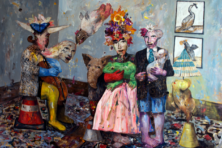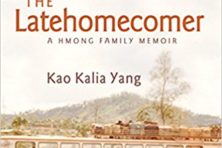Door County Reads Author on Writing, Refugee Experience
- Share
- Tweet
- Pin
- Share

This year’s Door County Reads book selection is The Latehomecomer: A Hmong Family Memoir, by Kao Kalia Yang. The book is the memoir of a Hmong family displaced by war, a childhood in the Ban Vinai refugee camp, and her family’s experiences making a life in America. The author will give a keynote address at 7 pm on Thursday, Feb. 8 at Stone Harbor Resort in Sturgeon Bay.
Myles Dannhausen Jr. caught up with the Minnesota writer to discuss her book, her writing process, and a refugee’s perspective on American political rhetoric today.
Myles Dannhausen Jr. (MD): I’m always curious how people go about writing about their family, about traumatic, personal experiences. Was it difficult for you to be the voice for your family?
Kao Kalia Yang (KKY): For me it began a long time ago because I was interpreting for them at such a young age. When you spend your whole life telling their story and being their voice, it’s not as hard. So it was this process of sitting back, going back to my childhood and finding all of the words I had interpreted for them my whole life. But it’s also the reality of being poor. We lived in a 900-square-foot home. My parents couldn’t hide their poverty. They couldn’t hide the fact that they needed us to go to the bank and speak for their behalf. Or to settle issues at work.
MD: You’re coming to a place, Door County, that is incredibly monocultural, as you’ve done before. Do you find it challenging, or invigorating, to bring a story like this to a community with so little diversity?
KKY: If they know my work, it’s very comfortable. I find that when I go into a new community like this and they don’t know anything about my work it’s harder to garner their interest. I have to garner their respect. I pour my heart out to them, and when I’m done there’s always people that come up to me and they say they didn’t expect to learn as much as they did. Which is sort of a complex compliment. But anywhere where there’s poor folks, they say that’s my story too. Once I had a mother come up to me with her son, and she said, “We came here to see an American writer. What are you doing here?” My name is Kao Kalia nice to meet you. Have a seat and you’ll find out what I’m doing here. It’s her life, and her son’s life, I’m hoping to change.
MD: You wrote this book in 2008, but it’s particularly relevant in the present moment, as we’re enthralled in debates about what immigrants we allow to come here and what refugees we accept. How do some of the president’s words about refugees and immigrants land for you?
KKY: As a woman, I’m insulted by his conduct. His words affect me in a horrible, horrible way. As a refugee and an immigrant, it makes me really sad that in the highest office in the land we’ve elected someone with so little compassion. I don’t feel loved or cared for by this administration. But when I look at this country, as a family, I feel loved.
MD: What do we get wrong when we talk about refugees and immigrants?
KKY: The average person doesn’t understand that when you accept refugees you’re accepting incredibly hardworking, resilient people. They don’t understand how hard you have to fight to get here. How resourceful you have to be, how much you had to survive. People don’t understand that it makes you a stronger nation. There’s this fear that you’ll lose yourself, but you won’t. If you want to be a great country, you need the blood of the refugee. When you say no, you’re stopping the world from becoming a better version of itself.
MD: What was it like for your family to be refugees, to not have a home, and be told that this country doesn’t want you? What do you hope for in those moments?
KKY: We never knew if we were going to survive or not. We knew people were going to be shipped back to Laos and be killed. I remember the feeling of being captive. Camp was 400 acres and there were nearly 40,000 of us. We got food three days a week. My mom had six miscarriages in the camp because she never had enough to eat. People were dying in the camp all the time. The number one cause of death was suicide, because all the adults had PTSD. But I have good memories too. I remember smelling the grass, seeing puppies, the feeling of my father’s arms holding me up to see the horizon. Our hope was to just go anywhere at all. My father chose to come to Minnesota because he heard they had jobs for low-skilled labor and he heard there were good schools. I just wanted to go someplace where people weren’t dying, that wasn’t haunted.
MD: You said there’s a lot of pressure on the children of refugees. Why?
KKY: Our families left for us. Everybody tells you that it’s for you, that everything they’re doing is for you to have a better life. So by the time you come to this country you come with such enormous pressure. For every Hmong you meet, two died in the war or the camps or when they were sent home. So you feel like you have to live lives that are huge, that are bigger than yourself. That’s a lot of responsibility.





